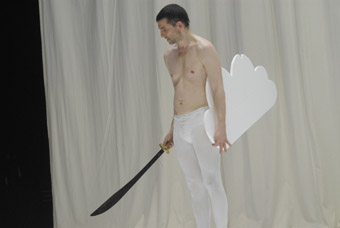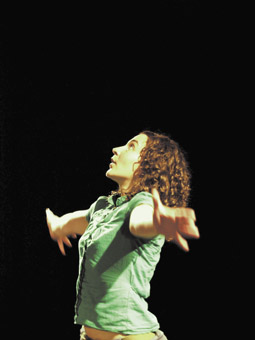matters of choice
martin del amo: nottdance08, nottingham, uk

Thomas Lehman, Heromatik
photo Thomas Aurin
Thomas Lehman, Heromatik
THE THING WITH FESTIVALS IS THAT YOU ARE ALWAYS BOUND TO MISS SOMETHING THAT’S PROGRAMMED SIMULTANEOUSLY WITH SOMETHING ELSE. THIS WAS NO DIFFERENT WITH NOTTDANCE08. MAYBE IT WAS EVEN MORE PRONOUNCED, SINCE FOR THE FIRST TIME IN ITS 17-YEAR HISTORY AS AN INTERNATIONAL FESTIVAL FOR EXPERIMENTAL DANCE AND PERFORMANCE EVENTS IT TOOK PLACE NOT ONLY IN NOTTINGHAM BUT ALSO IN LONDON. INTERESTINGLY, THE EXPERIENCE OF HAVING TO CHOOSE BETWEEN WHAT YOU WERE GOING TO SEE AND WHICH CITY YOU WERE GOING TO BE IN AT WHAT TIME, TIED IN NICELY WITH THE FESTIVAL’S CENTRAL PREMISE THIS YEAR—CHOICE.
To fully explore the notion of choice, the festival’s artistic director Nicky Molloy and her team decided to invite groups of audience members, young people and three international artists to each choose some of the work that would be presented in the festival.
artists’ choice
Among the artists asked to curate an evening of work for nottdance08 was Maria La Ribot (Spain), an internationally recognised dancer and choreographer, maybe best known for her cycle of work Distinguished Pieces. She selected Spanish artist Juan Domínguez.
The set up for Domínguez’ solo work All Good Spies Are My Age is deceptively simple. Elegantly dressed in a cream-coloured suit with a brown shirt and brown shoes, Domínguez sits at a table and places small cards in front of a camera which projects their image onto a large screen next to him. The text on the cards describes how the piece has come into being. At first there is the sense that this might be the precursor to something else but gradually we understand that this is all there is: the recreation of the creation process through written text is the actual piece. Reading projected text for an hour and 15-minutes could easily become boring, but surprisingly it doesn’t. This is largely due to Domínguez’ keen understanding of audience expectation and his impeccable sense of composition. He carefully introduces various threads of narratives and meta-narratives, then starts to interconnect them. We read about his own personal situation while making the work—problems with funding bodies, his fascination with coincidences, his obsession with ageing. We are also being fed, bit by bit, information regarding the meaning of the different colours the text is written in and this way acquire clues as to how to interpret what unfolds in front of our eyes. Or are these clues red herrings? Slowly, the description of how the piece was developed gives way to the recounting of daydreams, fantasies and lofty ideas for new works. The mood turns increasingly surreal, until it is not clear any more if what Domínguez tells us is true or not. What is fact, what is fiction? What is life and what is art? And is there, in fact, a difference between the two?
young people’s choice
Two performance events at nottdance08 were chosen by panels of audience members. One of them by was by a group of 16–19 year olds. And it has to be said their choice was excellent. They decided to present a double bill consisting of works by Turkey’s acclaimed Taldans Company and German-born emerging choreographer Gabriele Reuter. Whereas Taldans’ Sek Sek, an investigation of various states of instability, is certainly an engaging and intriguing work, Reuter’s solo piece Inventory/(Räumung) is a true discovery.

Gabriele Reuter
photo Florian Thiele
Gabriele Reuter
Like Domínguez, Reuter uses words to trigger the audience’s imagination. This time it’s spoken text and she blends it with movement. As her piece is about to begin, she tells us, “Before I start, I want to talk a little bit about the spatial arrangements here.” And this is exactly what she goes on to do. Integrating dance with philosophical musings on notions of time and space, Reuter takes us on a tour across the empty stage, imbuing different parts of the space with certain characteristic traits. For example, she introduces us to a spot near centre-stage which, according to her, is a “vague space.” Appropriately, she can’t tell us much about it. Then there is the space in which “to tell something personal.” Reuter comically refuses to go near it, as she feels she doesn’t know the audience well enough yet. There is also the corner for mother tongue. The moment she enters it, she starts speaking German. Reuter is a charismatic performer with considerable charm and a real knack for communicating with an audience. She seduces us with quirkiness and a light touch without ever leaving any doubt about the conceptual rigour and the genuine interest driving her investigation into the complex relationship between dance and space.
nottdance dialogue
Consistent with the overarching premise of nottdance08, choice was also the central focus of its residency initiative, entitled nottdance dialogue. Here, choice was not explored as a curatorial principle but as an integral aspect of artistic practice. Made possible through a partnership between nottdance producer Dance4, Springdance (Utrecht, Netherlands) and National Dance Centre Bucharest (Bucharest, Romania), a week-long residency brought together 12 international emerging artists, four from each country. It took place in Nottingham in the week leading up to the festival and was facilitated by German dancer and choreographer Thomas Lehmen and UK producer Rose Fenton. Its aim was to encourage the exchange of ideas and experiences and a dialogue about how artists present themselves. The event as such was not public but was complemented by four evenings of showings from the participating artists. Among the most interesting offerings were a mesmerising duet for two male dancers by Jack Gallagher (Netherlands) and two works by the all-female dance theatre collective MIKS (UK). They were choreographed by Frauke Requardt and Athina Vahla respectively and form part of MIKS’ triple bill project n+. Performing in works by two different choreographers allowed MIKS to showcase their significant performative range. In Requardt’s piece, n+2 flappers, an irresistible Charleston-inspired reverie, they dazzled with great musicality and comic timing. Vahla’s n+3 Objects of Friction and Fact, exploring the mythological element of the triad and partly based on Kurt Vonnegut’s A Man Without a Country, was an altogether more sombre affair. It had MIKS exchange their pink Charleston outfits and black flapper wigs for grey suit pants and white blouses, executing complex choreographic phrases in and out of synch with each other, engage in ensemble work consisting of catching and falling, as well as sing and deliver spoken text in both English and French.
nottdance in London
Among the nottdance events taking place in London was the presentation of Thomas Lehmen’s most recent work Heromatik. Inspired by the over the top characterisations of good and evil in Samurai films, Lehmen gets up to all kinds of shenanigans, exploring archetypes of the Hero. In one moment he engages in an epic sword fight with an imaginary enemy, wielding a rattling sword, obviously a theatre prop. He then becomes the victim of an invisible yet unimaginably cruel perpetrator, eliciting from him sobs and whimpers of sheer terror, all the while cowering on the floor, helplessly trying to defend himself. These evocations of imaginary worlds and characters are later contrasted with the real time destruction of much of the set, made up of several styrofoam cut-outs. Lehmen ferociously attacks one of them with a microphone until it is completely obliterated. He then continues his assault on the stage with an electric fan. The result, pieces of styrofoam strewn everywhere, is then topped by his using a smoke machine to “smoke out” the stage, leaving behind a scenario of chaos and devastation. Lehmen’s stage persona resembles that of a little kid, grappling with the complexities of human existence, full of wonder but also capable of great harm, sometimes unknowing, sometimes deliberate.
Widely regarded as one of Europe’s most innovative and forward thinking dance artists of recent years, Lehmen is clearly committed to experimentation and the continuous questioning of his own artistic practice. As he explains in his brief introduction, rather than focusing on showing a finished piece, Lehmen uses a set of fixed parameters as the backbone for Heromatik and rearranges and expands on them for each performance. In a festival dedicated to concepts of choice, this approach is an apt reminder of choice as an essential artistic driving force.
Nottdance08: Juan Domínguez, All Good Spies Are My Age, concept and performance Juan Domínguez; Gabriele Reuter, Inventory/(Räumung), choreography and performance Gabriele Reuter, dramaturgy Michael Pinchbeck, lighting Wassan Ali; Jack Gallagher, Not Yet Dancing, choreography Jack Gallagher, music Mark Poydsen, photography Theo Nikkus, video Bernie van Velzen; Frauke Requardt, n+2 Flappers, choreography Frauke Requardt, performers MIKS (Anais Bouts, Sara Lindström, Ida Uvaas), sound John Zorn; Athina Vahla, n+3 Objects of Friction and Fact, choreography Athina Vahla, performers MIKS, sound Bas Vellekoop, The Third Eye Foundation; Thomas Lehmen, Heromatik, concept and choreography Thomas Lehmen; Nottdance, Nottingham and London, Oct 17-26
RealTime issue #88 Dec-Jan 2008 pg. 31






